JOHOR BAHRU: Cape EMS Bhd, a leading Malaysian-based electronic manufacturing services (EMS) solutions provider with global presence, has signed a memorandum of agreement (MoA) with Perak Transit Bhd, a leading operator of integrated public transportation terminals in Malaysia.
This landmark partnership sets the stage for the joint planning and execution of large-scale infrastructure and energy projects aimed at modernising public transport nodes and expanding clean energy adoption in Perak.
The MoA encompasses two core project scopes. Firstly, Cape EMS and Perak Transit will explore the implementation of an e-mobility initiative to enhance the functionality and interactivity of smart bus stops.
Secondly, the parties intend to collaborate on the development of an electric vehicle (EV) hub in Ipoh, focusing on a charging and mobility centre.
As part of the agreement, Cape EMS will serve as a strategic service provider across identified project sites owned or managed by Perak Transit or its subsidiaries.
Cape EMS is expected to lead the delivery, installation, engineering works, testing, and commissioning of the required systems and infrastructure through its fully owned subsidiary.
The group will also support preventive maintenance activities for the deployed equipment and provide expertise in securing the necessary permits, licences, and regulatory approvals.
Cape EMS, in a statement, said the group looks forward to joining forces with Perak Transit on a progressive collaboration that places sustainability, innovation, and mobility at the heart of public infrastructure.
“This alliance reflects Cape EMS’s growing momentum in delivering high-impact renewable energy and smart city solutions as part of our broader expansion strategy.”
With this MoA, Cape EMS and Perak Transit are poised to contribute to Malaysia’s sustainable infrastructure ambitions by combining their respective expertise in precision manufacturing and public transport operations.
Together, both parties aim to deliver forward-looking, high-quality solutions that support the nation’s clean energy transition while redefining the future of public mobility through smart and
sustainable infrastructure development.









